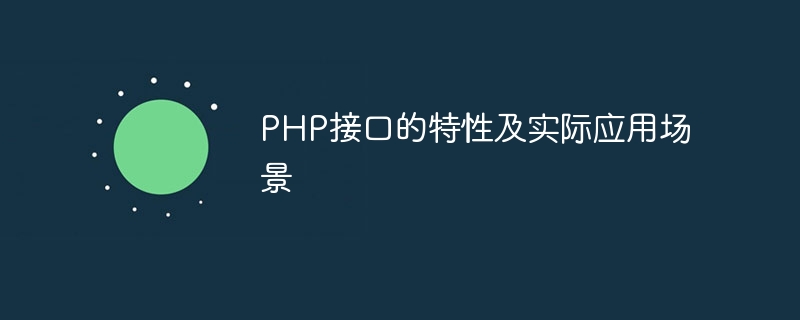Home >Backend Development >PHP Tutorial >Characteristics and practical application scenarios of PHP interface
Characteristics and practical application scenarios of PHP interface
- WBOYWBOYWBOYWBOYWBOYWBOYWBOYWBOYWBOYWBOYWBOYWBOYWBOriginal
- 2024-03-24 14:45:12663browse

As a popular server-side scripting language, PHP provides powerful interface functions that can be used to build the back-end interface of Web applications. This article will introduce the characteristics of the PHP interface and practical application scenarios, and provide specific code examples for readers' reference.
1. Characteristics of PHP interface
-
Easy to implement: The implementation of PHP interface is very simple, you only need to add it before the method of the class Add the
interfacekeyword to define an interface. - Specifies the relationship between interfaces and implementation classes: The interface defines a set of public method standards, and implementation classes need to implement these methods to ensure the maintainability and scalability of the code.
- Support multiple inheritance: In PHP, a class can implement multiple interfaces, thereby realizing the function of multiple inheritance.
- Facilitates code reuse: Through interfaces, the same method can be implemented in different classes, thereby improving code reusability.
2. Practical application scenarios of PHP interface
- RESTful API development: In web applications, it is often necessary to Provide RESTful API to realize data interaction with front-end pages. By defining an interface, you can standardize the calling method and return data format of the API. The following is a sample code of a simple RESTful API:
<?php
// 定义接口
interface ApiService
{
public function getUsers();
public function getUserById($id);
public function createUser($data);
}
// 实现接口
class ApiServiceImpl implements ApiService
{
public function getUsers()
{
// 获取用户列表的实现代码
}
public function getUserById($id)
{
// 获取指定用户信息的实现代码
}
public function createUser($data)
{
// 创建用户的实现代码
}
}
- Payment interface development: In e-commerce websites, it is usually necessary to access a third-party payment interface to implement Online payment functionality. By defining the payment interface, you can standardize the interaction with the payment platform. The following is a sample code for a simple payment interface:
<?php
// 定义支付接口
interface PaymentService
{
public function createOrder($orderData);
public function makePayment($order);
public function refundOrder($order);
}
// 实现支付接口
class PaymentServiceImpl implements PaymentService
{
public function createOrder($orderData)
{
// 创建订单的实现代码
}
public function makePayment($order)
{
// 支付订单的实现代码
}
public function refundOrder($order)
{
// 退款订单的实现代码
}
}
- Data interface docking: When exchanging data between different systems, you can define an interface. Standardize data format and interface calling method. The following is a simple sample code for data interface docking:
<?php
// 定义数据接口
interface DataExchangeService
{
public function fetchData($url);
public function sendData($url, $data);
}
// 实现数据接口
class DataExchangeServiceImpl implements DataExchangeService
{
public function fetchData($url)
{
// 获取数据的实现代码
}
public function sendData($url, $data)
{
// 发送数据的实现代码
}
}
3. Summary
Through the introduction of this article, we have learned about the characteristics and characteristics of the PHP interface Practical application scenarios and specific code examples are provided. By rationally using interfaces, we can make the code more standardized, maintainable and scalable, and improve development efficiency and code quality. I hope readers can better use PHP interfaces to build efficient Web applications through learning and practice.
The above is the detailed content of Characteristics and practical application scenarios of PHP interface. For more information, please follow other related articles on the PHP Chinese website!

